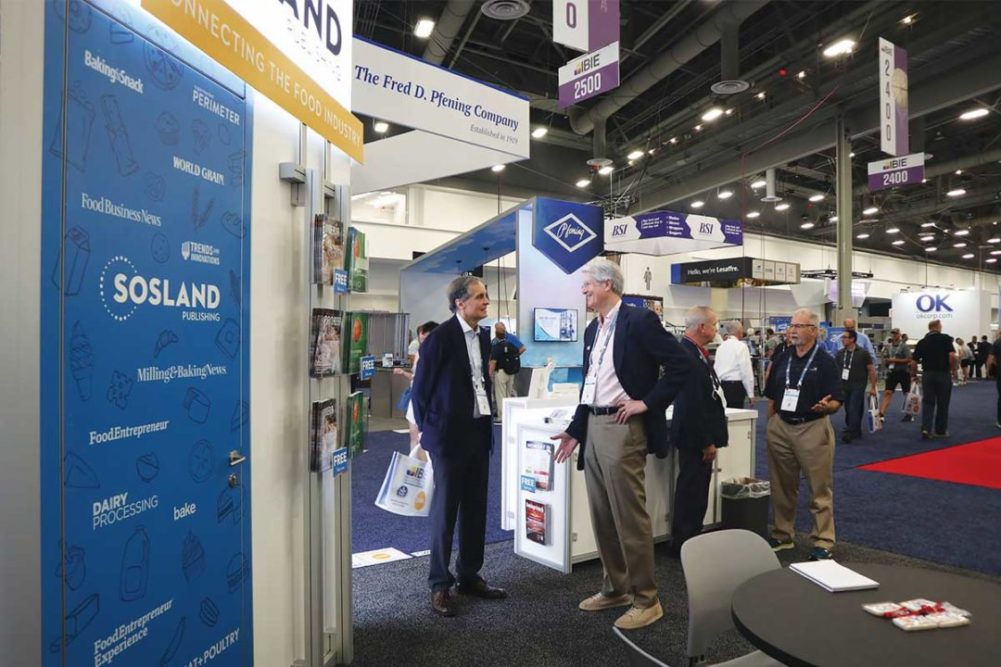LAS VEGAS — Further expanding the range of its sustainability projects, Grupo Bimbo SAB de CV has launched regenerative agriculture pilot tests both in Mexico and the United States, said Daniel Servitje, chief executive officer.
Mr. Servitje previewed the initiative in an impromptu interview with Milling & Baking News, Sept. 19, at the Sosland Publishing Co. booth (No. 2525) during IBIE 2022 at the Las Vegas Convention Center.
Calling regenerative agriculture a “huge initiative,” Mr. Servitje said agriculture accounts for the largest proportion of Bimbo’s Scope 3 greenhouse gas emissions, meaning emissions in a company’s value chain but not from assets owned or directly controlled by the company.
He said changing growers’ agricultural practices in a way that adopts regenerative agriculture techniques will take years, and that Bimbo sees working closely with flour millers as “key” toward making progress.
No-till/low-till farming, cover crops and crop rotation are among numerous techniques considered part of regenerative agriculture. In Mexico, Bimbo has been working with the famed International Wheat and Maize Improvement Center (CIMMYT, established by Nobel Peace Prize laureate Norman Borlaug), based in El Batan, Mexico, to pilot regenerative agriculture projects in that country. Mr. Servitje said the early results of the pilot tests have been impressive.
“When you go through the steps, instead of emitting carbon, you actually capture carbon,” he said.
Bimbo has committed to become a net-zero carbon emissions company by 2050 with specific targets for 2030 and 2040. Mr. Servitje said already the company’s baking plants at present derive 88% of their energy from renewable sources, including solar panels that have been installed or contracts with third parties.
The company recently announced plans for a significant expansion in its electric vehicle fleet in Mexico. Mr. Servitje said spending money on these vehicles is emblematic of the way the company stays focused on the long term. While the vehicles are significantly more expensive to purchase than conventional vehicles, they enjoy reduced operating and maintenance costs immediately.
“On the renewable side, everything pays for itself,” Mr. Servitje said.
Asked whether the small carbon footprint of grain-based foods relative to other food sources is appreciated by the public, Mr. Servitje replied that many positive attributes of grain-based foods are not adequately appreciated by consumers.
“But the world is becoming more aware of the ramifications” of food production on the environment, he added.
Commenting on IBIE 2022, Mr. Servitje called it a “great event” and said the show’s planners and organizers should be commended.
“We probably have the largest number of associates at IBIE we’ve ever had,” he said. “They feel it is rendering value.”
As is the case at many companies, Grupo Bimbo administrative employees continue to mostly work remotely in the wake of the COVID-19 pandemic, Mr. Servitje said. He estimated no more than 15% of the company’s office staff is actually in the office on any given day. While the switch to remote work has been successful, on-site activity remains important for “teaching, coaching and bringing on new talent,” he added.
While production staff does not have a remote-work option, Mr. Servitje said it is clear that this part of the workforce, too, is looking for greater flexibility in its hours, and that it is incumbent on the baking industry to find ways to accommodate these workers.
Over the past 10 years, Grupo Bimbo has continued to expand internationally, with significant acquisitions in India and Europe, Mr. Servitje said. While Bimbo is the largest global baking company, he said its worldwide baked foods market share is only about 4%, a much smaller figure than is the case for market leaders in categories such as confectionery and soft drinks.
He said the company continues to seek to enter new international baked foods markets.

